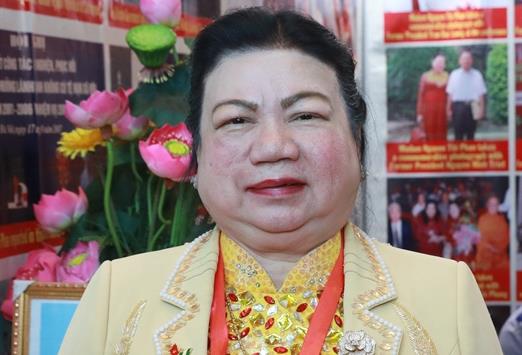Business executives talk about their expectations with the "Meet ambassadors from the Middle East and Africa" event.
Business executives talk about their expectations with the "Meet ambassadors from the Middle East and Africa" event.
Maher Al Arayssi, Chief of Representative Office Purchasing Manager (Vietnam), C-food International S.A.L.

We have exported Vietnamese seafood products to 13 markets in the Middle East, Africa and eastern Europe since 1998. The Vietnamese seafood industry is developing year by year but the only obstacle we face for dropping seafood export is raw material issues, which sometimes limit the exports.
The quality standard of Middle East and Africa meets Vietnamese quality. But sometimes the season changes, clearly downgrading the quality of raw materials and demand worldwide. Sometimes we have to search for other sources beside Viet Nam.
We are facing difficulties exporting products to Saudi Arabia as the country has banned seafood imports for a year and a half. It’s a big market so today we want to discuss the problem with the ambassador to see how the Vietnamese government solves the problem.
The support we’ve gotten is in the development of the industry, which is usually the Government’s support for processors in Viet Nam as exporters. We hope the government will support the farmers, the processors because this will facilitate exports on different levels of Vietnamese seafood products.
So far the quality of Vietnamese products is acceptable. But Viet Nam has to search for new methods and development ideas to keep the quality of Vietnamese seafood at very high level. We want to meet the authorities, ambassadors to check what the problems we can solve. I hope the event will be held every year to check the problems we’re facing.
Le Minh Tri, vice director of the Trade Promotion Centre in the Mekong Delta province of Soc Trang

The Middle East and African markets are new with large demands for farm produce. Soc Trang Province’s main products are agricultural, so we think these are potential markets. The biggest challenge remains in transportation. We expect Middle East and African markets will create conditions in terms of transportation and customs procedures to facilitate our exports.

The Middle East and Africa have a lot of potential and can be a major boost for Viet Nam’s agricultural exports. Especially in the Middle East, we see customers with very high incomes but their natural conditions are too harsh for plantation.
The demands of people in the Middle East are high and hard to meet, but Lavifood is confident to meet their standards because Lavifood is capable of providing agricultural products of high quality.
The differences in regulations and payment mechanisms, which are based on TT, have increased risks for Lavifood and other Vietnamese food exporters. In addition, high logistics expenses must be made with high selling prices, so Vietnamese exports will get less competitive in the market.
Viet Nam’s co-operation with the Middle East has a lot of potential. However, it requires the Government to make better efforts to connect African consumers and local authorities with Vietnamese firms. The Government’s action is the insurance for Vietnamese exports in the Middle East market.
We expect the ambassadors’ meeting will help improve the access to Middle East and Africa for Vietnamese products. Lavifood is working on the final stages to complete an agreement with the United Arab Emirates (UAE) while we have met the ambassadors of Qatar, Kuwait and Saudi Arabia to increase our exports to the Middle East.
Tu Thanh Huong, Project Director, Vedico

We have worked with the Vietnamese firm Giang Nam Seed Company and the Mekong Delta Rice Institute to export Vietnamese rice seeds to Sierra Leone, which has been well-received and highly appreciated by local people.
The Vietnamese seeds are very productive, producing six tonnes per hectare – triple local seeds which produce only two tonnes per hectare. The Vietnamese seeds can now cover 10,000-15,000ha and we want to increase it to 100,000-500,000ha to assure Sierra Leone’s food security and exports.
Africa is known for its enormous amount of land, which is highly appropriate for the production of organic foods. In the future, locally-made products can be exported to the US and Europe.
As we are operating in Sierra Leone, the local government has given us a lot of support as we create jobs for local people and revive the country’s agriculture. By providing Vietnamese seeds, Sierra Leone’s food security is assured and the country can export in the near future.
At this event, we hope Vietnamese companies will be willing to come to Africa, transfer technologies to local people and organisations, and carry out more agricultural business in Africa to boost Viet Nam’s export to the continent. I want to connect Vietnamese companies with African partners to expand their operations and improve co-operation with local authorities.
Nguyen Thi Phan, General Director of Import-Export Trading and Service Co Ltd – Ben Tre

Our business, with 30 years of experience and the support of scientists, hopes to assist the Vietnamese and international communities fight diseases. The products have cut the number of drug-addicted patients significantly.
Nigerian Ambassador to Vietnam Mazi Okafor Matthias Ojih in 2012-15 came to our office one day and brought the medicines back to his home. Then the Nigerian health agency asked us to sell the medicines in the country.
We have now been licensed in all African countries. We are also present in Laos, Cambodia, Brazil and the US. The good thing is we have a good relationship with the embassies and the company is looking to expand in other markets as well.
The number of African orders is rising and it proves the African drug market is developing sharply. But we want to work with African partners to change the payment method from telegraphic transfer to letter of credit so we aren’t the one bearing all the risks. — VNS





